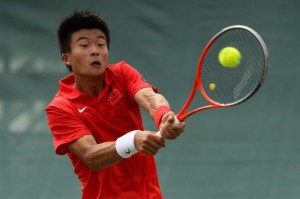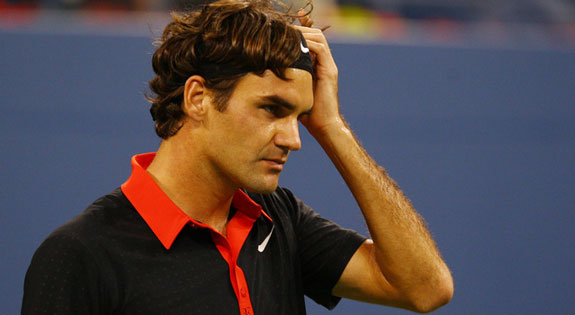By Randy Walker
@TennisPublisher
A man representing China has never made the singles main draw in the history of the U.S. Open tennis championships. However, two men are looking to make an historic mark in New York for the world’s most populous country before the tournament officially kicks off next week.
Di Wu and Yan Bai are two of 128 players men competing in the U.S. Open qualifying tournament that began Tuesday at the Billie Jean King USTA National Tennis Center. The tournament will determine 16 men – and 16 women in a 128-player women’s qualifying tournament – that will join the main draw of the final Grand Slam event of the year that starts Monday, August 29.
Wu won his opening round match on Tuesday 6-0, 4-6, 6-2 over David Perez Sanz of Spain. (Wu spoke on video with me after his win here: https://www.youtube.com/watch?v=ogJBZJfFuiA) Bai plays former Wimbledon junior champion Noah Rubin of New York on Wednesday.
Not only has there never been a man representing China in the singles main draw at the U.S. Open but there also has never been a man ranked in the Top 100 of the ATP World Tour rankings. In the August 22 rankings, only two men from China are ranked in the top 200 – Ze Zheng as the top ranked Chinese man in singles at No. 174 and Di Wu at No. 178. Zheng is not participating in the U.S. Open qualifying tournament. Bai is ranked No. 273.
“He is getting closer,” said Wu’s coach, the former Italian standout player Davide Sanguinetti, of his charges attempt to crack the top 100, a mendoza line of pro tennis.
Wu is 24 years old and lives in Shanghai, but was born in Wuhan, China, also the birthplace of the Li Na, the icon of tennis in China as the first-ever Chinese player to win a major singles title at the 2011 French Open and the 2014 Australian Open. Li Na is the player by which all of Chinese tennis is measured, leading the charge of the more successful history of Chinese women in pro tennis. Currently there are three Chinese players in the top 100 (Shuai Zhang, Saisai Zheng and Qiang Wang). Jie Jheng and Peng Shuai have negotiated their ways to major semifinals and the pair of Chinese women have also excelled at the Olympic Games with Tian Tian Sun and Ting Li winning women’s doubles gold in 2004 in Athens, Greece.
Wu reached a career-high ranking of No. 148 in March of this year, but has struggled the last few months with a virus that has slowed his progress, according to Sanguinetti. He started this year by advancing through the qualifying rounds at the Australian Open, where he lost in the first round to Austin Krajicek of the United States. Wu had made men’s tennis history for China at the Australian Open in 2013 and 2014 as the first man representing China to play in the singles main draw there (and at any other Grand Slam tournament) after winning a special wild-card tournament open to players from Asia two years in a row. In 2014, Wu reached the final round of qualifying at the U.S. Open but fell one match shy of history losing to Illya Marchenko of Ukraine.
After the Australian Open this year, Wu became the first man representing China to win on the Challenger level of professional tennis – the equivalent of AAA level of Major League Baseball – winning the Maui Challenger in Hawaii. Wu not only won the title, but won a bet with his coach Sanguinetti, who was forced to shave his head in a motivational stunt after Wu’s win. A former top 50-ranked pro who helped Italy to the Davis Cup final in 1998, Sanguinetti has been working with Wu for a year. He likes the progress his charge is making as he and his countrymen race to try and become the first Chinese man to rank in the top 100.
“They are all competing to go to the top 100,” Sanguinetti said. “Hopefully, there will more (Chinese) players so there will be competition and they will be pushing each other. They really think every time when they step on the court ‘I would like to be the first one.’ Of course, the first one will be remembered. I think there is a little pressure there.”


